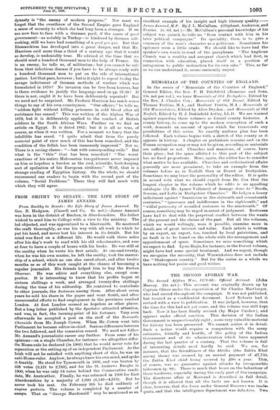MEMORIALS OF THE COUNTIES OF ENGLAND.
In the series of "Memorials of tho Counties of England," General Editor, the Rev. P. H. Ditchfield (13emrose and Sons, 15s. net per vol.), we have Memorials of Old Derbyshire, Edited by the Rev. J. Charles Cox ; Memorials of Old Dorset, Edited by Thomas Perkins, M. A., and Herbert Pentin, M.A. ; Memorials of Old Warwickshire, Edited by Alice Dryden; and Memorials of Old Norfolk, Edited by H. J. Dukinfield Astley, LL.D. We aro warned against regarding these volumes as formal county histories. A county history, to come up to the modern conception of such • work, demands an amount of space which far transcends any possibilities of this series. No exactly uniform plan has been followed. Each volume begins with a sketch of the county as it appears in history. A chapter on prehistoric remains and on the Roman occupation may or may not be given, according as materials are sufficient or not. Churches and mansions, of course, have their place ; but the space allotted to this part of the subject has no fixed proportions. Here, again, the editor has to consider what matter lie has available. Churches and ecclesiastical affairs generally are more prominent, to take an example from the volumes before us, in Norfolk than in Dorset or Derbyshire. Sometimes we may trace the personality of the editor. It is quite in accord with what we should expect from Dr. Cox that the longest chapter in the volume which he edits is an appalling catalogue (by Mr. Aymer 'Valiance) of damage done to "Hoods, Screens, and Lofts in Derbyshire Churches." He lodges a heavy indictment against "fanaticism in the sixteenth and seventeenth centuries," "ignorance and indifference in the eighteenth," and "wilful perversity of so-called restorers in the nineteenth." Of course, something may be urged in arrest of judgment. Restorers have had to deal with the perpetual conflict between the wants of the present and the claims of the past. But all the volumes, which we would willingly, were it possible, examine more in detail, are of great interest and value. Each article is written by an expert, an expert, too, touched by local patriotism, and no fault is to be found on the whole with the arrangement and apportionment of space. Sometimes we miss something whioh we expect to find. Lyme Regis, for instance, in the Dorset volume, might have had some special treatment. And we regret, though we recognise the necessity, that Warwickshire does not include the "Shakespeare country." But for the series as a whole we have nothing but praise and good wishes.






















































 Previous page
Previous page